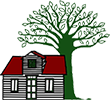Our project
Worldwide there is growing awareness and scientific evidence of the benefits, so-called ecosystem services that urban green spaces provide. Urban green spaces include trees and forests, parks and gardens, and "living green" roofs in cities. Ecosystem services provided by urban green spaces contribute to human well-being through:
- Regulating services, such as cooling the environment (micro-climate regulation, including reduction of the urban heat island effect), improving air quality, reducing noise, combating erosion and flooding,
- Cultural services, such as opportunities for recreation, social cohesion and aesthetic aspects, and
- Provisioning services, such as provision of fruit, seeds and building materials. As such, urban contributes to more inclusive, safe, resilient and sustainable cities, as included in the ’Sustainable Development Goal’ (SDG) 11.
Suriname has just over half a million inhabitants, of which more than half lives in the capital city of Paramaribo and its surrounding area. In Paramaribo in particular, the absence of an effective policy on green spaces can be felt due to a lack of public recreation spaces and increasing asphalt and concrete surfaces, which retain more heat, in city development. In recent decades, Paramaribo has experienced uncontrolled urban expansion. In recent years, street trees, urban forests and other vegetation increasingly have to make room for residential or infrastructure projects. In addition, climate forecasts for Suriname, predict an average temperature rise of 0.3 - 1.3 ° C for the coming 10 years.
As the Planning Act (1973) has not been operationalized and the Urban Planning Act (1972) is not implemented, there is no structural approach to the design and development of urban areas and there is insufficient attention on the role of green spaces for a livable Paramaribo. Definitions for "green landscaping” are too broad to ensure that trees are protected and conserved in Paramaribo. There is insufficient consideration of how existing green spaces can be included in the spatial design of an area.
The scientific evidence for the role of urban green spaces mainly comes from studies conducted in cities in subtropical or temperate climates. There is still much room for education and research on the role of green spaces in tropical cities of low-to middle income countries, taking into account differences in culture, demography, economic development and lifestyle. Literature shows that the urban heat island effect (the temperature difference between urban and nearby rural areas) can profile itself in a specific way in tropical cities. The dry and wet seasons in the tropics can ensure that the air and surface temperatures do not have a constant relationship. There is also a lack of knowledge about the effect of plant species, and the cooling effects due to shade in relation to humidity. Thus, we know that urban green spaces provide a cooling effect, but not exactly to what extent and in what way in the tropics. Knowledge about numerous other ecosystem services that urban green spaces in tropical cities provide is also limited. Often cities in the tropics differ not only in climate and ecology, but also in elements such as demography, economic development and lifestyle. This may affect the residents’ demand for ecosystem services, but also on the management options. Due to the limited knowledge about ecosystem services in tropical cities, Paramaribo cannot build well on similar findings.
